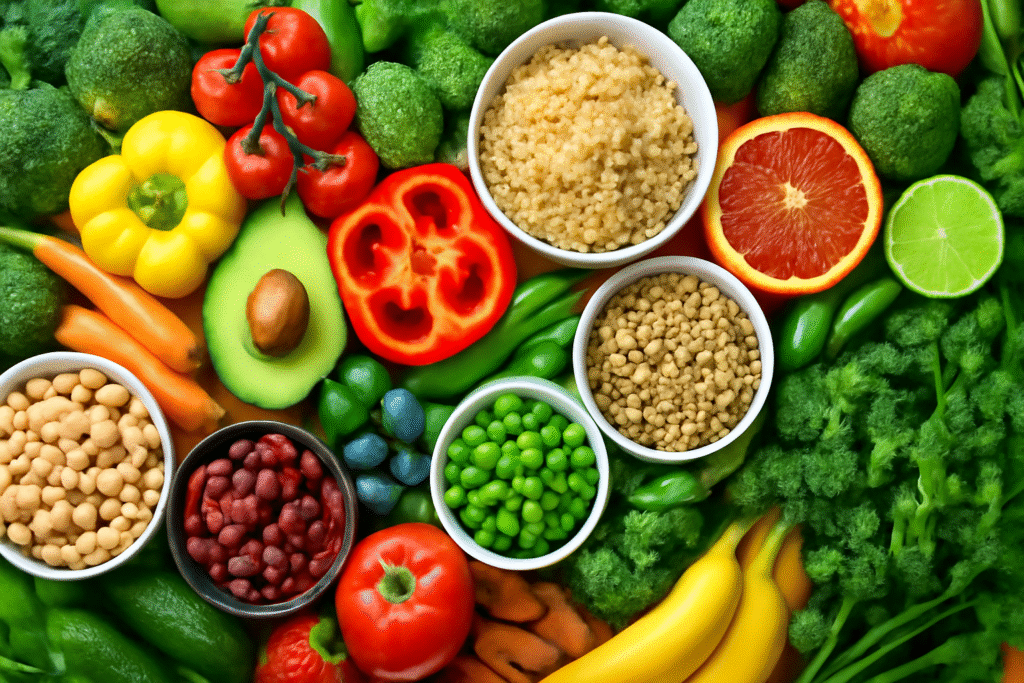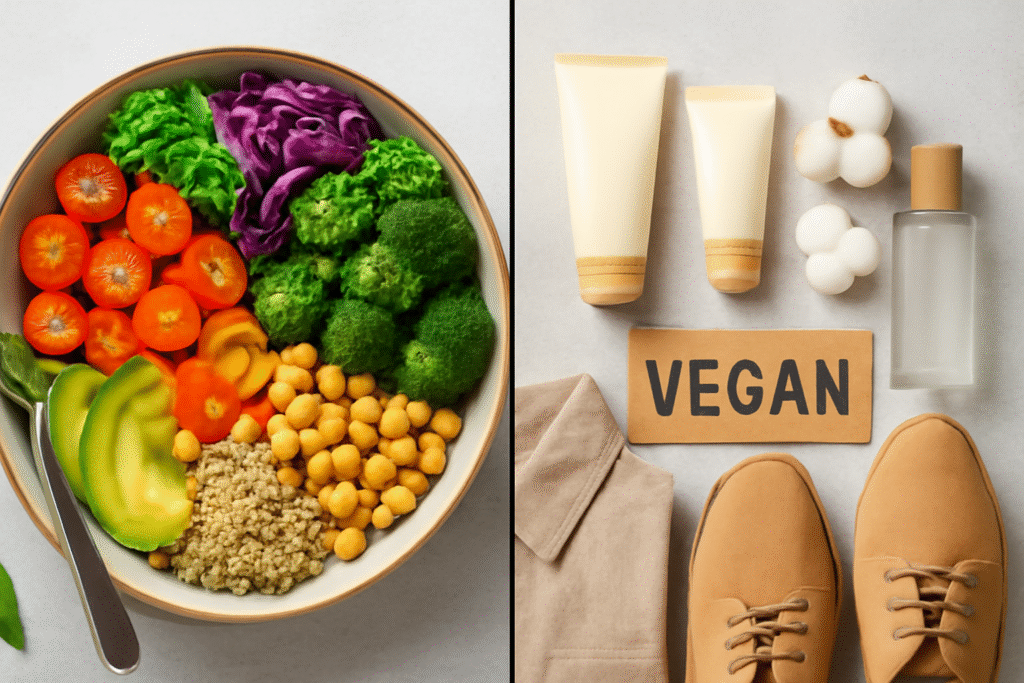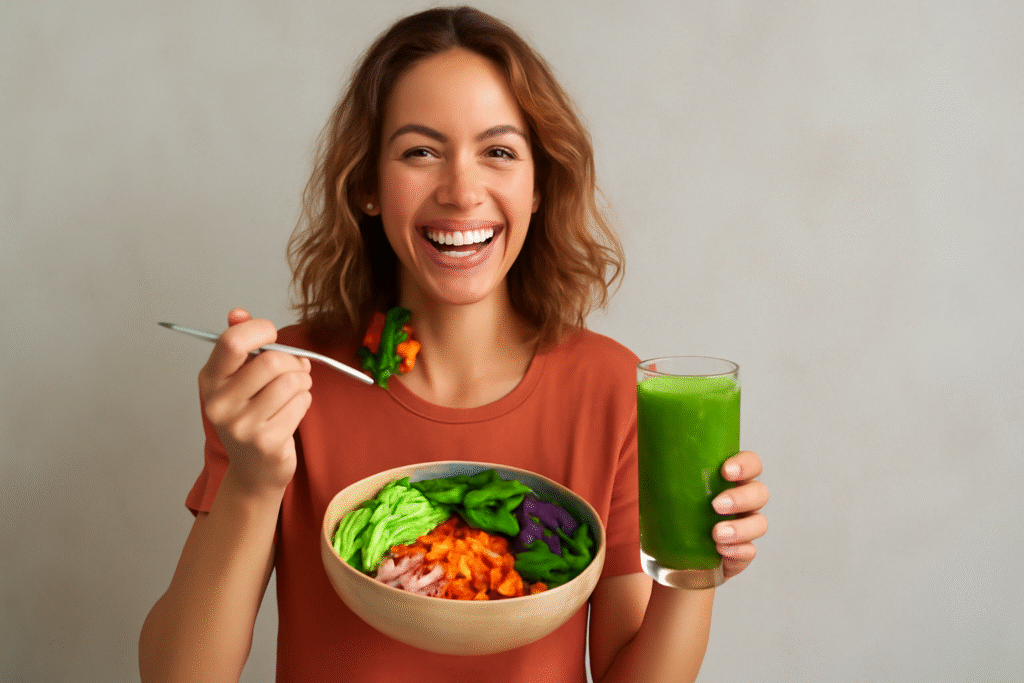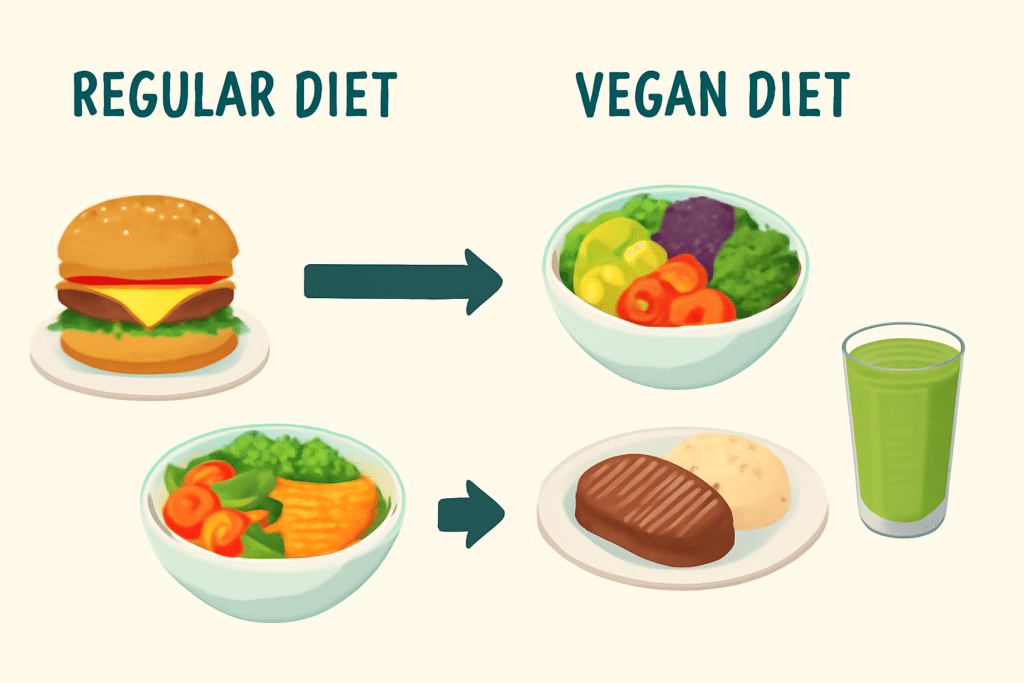
Why Go Vegan: 10 Powerful Reasons to Make the Switch and Improve Your Health, Environment, and Ethics
Are you feeling overwhelmed by the growing trend of plant-based diets and wondering, “Why go vegan?” 🤔 It’s a question that many people are asking as they look for healthier, more sustainable lifestyles. Whether you’ve seen it in the news, heard about it from friends, or just feel curious, the idea of going vegan might seem like a big step. But what if it’s the change you’ve been looking for to improve not only your health but also the environment and animal welfare? 🌱
In this article, we’ll dive into 10 powerful reasons why making the switch to veganism can be one of the most impactful decisions you make—both for yourself and the world around you. From boosting your energy levels to contributing to a more sustainable planet, these reasons go far beyond simply following a trend. If you’ve been wondering how a vegan lifestyle can improve your life, keep reading, because the answers are waiting for you! 😊
Table of Contents
ToggleWhat Is Veganism?
Veganism is much more than just a diet—it’s a lifestyle choice that revolves around avoiding animal products in all aspects of life. This includes not just food, but also clothing, cosmetics, and other consumer goods. 🌿 While the most common focus is on a plant-based diet, veganism extends to rejecting any product that harms or exploits animals.
Here’s a breakdown of what veganism entails:
- Plant-Based Diet: A vegan diet consists entirely of fruits, vegetables, grains, legumes, nuts, and seeds. 🥦 This means no meat, dairy, eggs, or honey.
- Cruelty-Free Living: Veganism also means choosing products that don’t involve animal testing or exploitation—think vegan skincare, clothing, and household goods. 🌸
- Ethical Standpoint: Many people choose veganism because of the ethical concerns regarding factory farming and animal cruelty. It’s about making choices that align with compassion and respect for animals. 🐾
In short, veganism is a holistic approach to living more consciously and ethically by reducing harm to animals and the planet. Whether you’re considering a full transition or just want to explore more plant-based meals, embracing veganism means making mindful choices that support a healthier and more sustainable world. 🌍

10 Powerful Reasons to Go Vegan
If you’ve been considering veganism, it’s essential to understand the real benefits behind this lifestyle choice. It’s not just about food—it’s about a shift toward a healthier, more sustainable, and ethical way of living. Here are 10 powerful reasons why going vegan can make a huge difference in your life and the world around you: 🌱
1. Improve Your Health 💪
A vegan diet is packed with essential nutrients that can improve overall health. Studies have shown that vegan diets tend to be lower in cholesterol and saturated fat, reducing the risk of heart disease, high blood pressure, and type 2 diabetes. Plus, a plant-based diet is rich in fiber, which promotes digestive health and helps with weight management.

2. Protect the Environment 🌍
Animal agriculture is a leading contributor to environmental issues such as deforestation, greenhouse gas emissions, and water pollution. By going vegan, you can reduce your carbon footprint significantly. It’s a simple way to live more sustainably and help combat climate change. The shift to plant-based eating conserves water and reduces the land needed for food production.

3. Promote Animal Welfare 🐾
Veganism is rooted in compassion for animals. Choosing plant-based foods means not supporting factory farming, where animals are often treated inhumanely. Veganism helps reduce animal cruelty and promotes better treatment of animals by eliminating demand for animal-based products.

4. Improve Your Mental Clarity 🧠
Research suggests that a vegan diet can improve cognitive function. By consuming plant-based foods, you’re boosting brain health with nutrients like omega-3 fatty acids, antioxidants, and anti-inflammatory compounds. This can lead to better mood regulation, mental clarity, and overall well-being.
5. Support Sustainable Agriculture 🌾
Plant-based diets support eco-friendly farming practices, such as crop rotation, reduced pesticide use, and healthier soil management. By choosing vegan products, you encourage farming methods that are better for the planet and future generations. Supporting sustainable agriculture leads to cleaner air and healthier ecosystems.
6. Strengthen Your Immune System 🦠
A vegan diet rich in vitamins, minerals, and antioxidants supports a strong immune system. With increased consumption of fruits, vegetables, and whole grains, your body gets the nutrients it needs to fight infections and reduce inflammation, helping to keep you healthier long-term.
7. Lower Your Risk of Chronic Diseases 🚫
Studies show that vegans have a lower risk of developing chronic conditions such as cancer, diabetes, and obesity. With less processed meat and fewer animal-based products in your diet, you are likely to experience a reduced risk of many diseases, leading to a longer and healthier life.
8. Save Money 💰
Believe it or not, going vegan can save you money. While some vegan products can be expensive, staples like beans, lentils, rice, and vegetables are typically much cheaper than meat and dairy. Plus, the long-term savings on healthcare costs from avoiding chronic diseases can be significant.
9. Promote Global Food Security 🌾
With plant-based foods being more efficient to grow than animal products, going vegan can help address food shortages worldwide. By eating more plants, you’re helping to make food production more sustainable and accessible, benefiting both local and global food systems.
10. Enhance Your Quality of Life 🌟
Veganism isn’t just about reducing harm; it’s about improving your quality of life. The benefits of eating more whole foods, being kinder to animals, and reducing your environmental impact can lead to greater happiness and fulfillment. Veganism encourages a mindset of health, empathy, and environmental responsibility.
How to Make the Switch to Veganism: A Practical Guide
Making the switch to veganism can feel overwhelming at first, but with the right approach, it’s easier than you might think. Here’s a practical, step-by-step guide to help you transition smoothly and confidently into a vegan lifestyle. 🌱

1. Start Slowly ⏳
You don’t have to make a dramatic change overnight. Begin by cutting out one animal product at a time. For example, start by eliminating dairy, then move on to meat, and finally eggs. This gradual approach makes the transition less overwhelming and more sustainable in the long term.
2. Find Delicious Vegan Alternatives 🍔
There are plenty of plant-based alternatives available, so you don’t have to miss out on your favorite meals. Look for vegan versions of cheese, milk, burgers, and snacks. Brands like Daiya, Beyond Meat, and Oatly offer tasty and accessible options. Keep experimenting until you find what works for you!
3. Focus on Whole Foods 🥑
While processed vegan foods are a great convenience, don’t forget about whole plant foods. Fill your plate with fruits, vegetables, legumes, grains, and nuts. These foods provide all the nutrients you need and are typically more affordable than their processed counterparts. A whole-foods-based diet will leave you feeling energized and nourished.
4. Plan Your Meals 🍴
Meal planning is key to staying on track with your vegan lifestyle. Spend some time each week planning your meals and snacks, so you always have a nutritious option available. This can also help reduce the temptation to reach for non-vegan foods when you’re hungry. Consider prepping meals in advance for the week!
5. Educate Yourself About Vegan Nutrition 🧑⚕️
To ensure you’re meeting all your nutritional needs, familiarize yourself with essential vitamins and minerals like Vitamin B12, Iron, Omega-3 fatty acids, and Calcium. Many vegan-friendly foods like leafy greens, legumes, and fortified plant milks can help you get these nutrients. If necessary, consider taking supplements, especially for B12.
6. Join Vegan Communities 🌍
Transitioning to veganism is much easier when you have support. Join online communities, social media groups, or local meet-ups. Connecting with others who are on the same journey can offer encouragement, advice, and even meal inspiration. You’ll feel more confident and motivated knowing you’re not alone in this transition.
7. Be Kind to Yourself 💖
Transitioning to veganism is a journey, not a race. If you slip up or find yourself eating something non-vegan, don’t be hard on yourself. Progress is key, and every positive change you make is a step toward a more ethical and sustainable lifestyle. Celebrate your achievements, no matter how small!
Embrace the Vegan Lifestyle for a Better Future
Making the switch to veganism is more than just changing what’s on your plate—it’s about making a conscious decision that benefits your health, the environment, and animals. 🌍 Whether you’re looking to improve your well-being, reduce your environmental footprint, or support animal welfare, veganism offers powerful, tangible benefits. By following the practical guide provided and taking it step-by-step, you can confidently transition into a plant-based lifestyle.
Remember, every small change counts. 🌱 Whether you go vegan overnight or start by cutting out a few animal products, you’re making a positive impact on your health and the planet. So, take that first step, embrace the change, and enjoy the journey. The world is full of delicious plant-based options waiting for you, and the benefits are worth every bite.
Start your vegan journey today, and see how it transforms not just your diet, but your life. 😊

Frequently Asked Questions (FAQ)
1. What are the health benefits of going vegan?
Going vegan can help reduce the risk of chronic diseases like heart disease, diabetes, and cancer. A plant-based diet is typically lower in saturated fats and rich in nutrients like fiber, vitamins, and antioxidants, which support overall health and well-being.
2. How does veganism help the environment?
Veganism reduces your carbon footprint by cutting down on the greenhouse gases produced by animal agriculture. It also conserves water, reduces deforestation, and minimizes the environmental impact associated with raising livestock, making it a sustainable choice for the planet.
3. Is veganism good for weight loss?
Yes, a vegan diet can support weight loss when it focuses on whole, plant-based foods like fruits, vegetables, and legumes. These foods are lower in calories and higher in fiber, which can help you feel full and satisfied while losing weight in a healthy way.
4. Do vegans get enough protein?
Yes, vegans can easily get enough protein from plant-based sources like beans, lentils, tofu, quinoa, and nuts. These foods are packed with protein and provide all the essential amino acids your body needs to stay healthy and strong.
5. Can veganism improve mental health?
Studies suggest that a vegan diet rich in plant-based foods can positively impact mental health by reducing inflammation and improving nutrient intake. Many vegans report feeling better mentally and emotionally due to the increased consumption of vitamins, antioxidants, and anti-inflammatory foods.
6. Is it expensive to eat vegan?
Not necessarily. While some vegan products can be pricey, a whole-foods-based vegan diet with items like beans, lentils, grains, and vegetables is often more affordable than buying meat or dairy. Meal planning and cooking at home can help you save money while eating healthy.
7. Can I get all the nutrients I need on a vegan diet?
Yes, with proper planning, you can get all the necessary nutrients on a vegan diet. Essential nutrients like Vitamin B12, iron, calcium, and omega-3s can be sourced from fortified foods, plant-based milks, leafy greens, and supplements if necessary.
8. How do I start a vegan diet?
Start by gradually eliminating animal products from your diet and replacing them with plant-based alternatives. Explore new recipes, try vegan-friendly snacks, and stock up on essential items like grains, legumes, fruits, and vegetables. With time and experimentation, you’ll find delicious vegan meals that fit your lifestyle. 🌱
